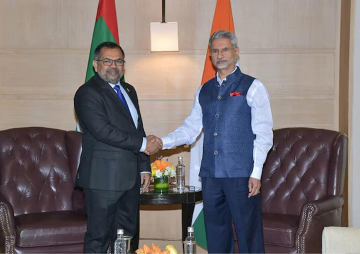Close to 12 years after the 9/11 attacks that led to the global war on terror, and defined the landscape of US foreign policy and national security strategy, President Barack Obama delivered a landmark speech, seeking to reorient US counter-terrorism policy. Speaking at the National Defense University in Washington D.C. Obama outlined a comprehensive strategy that aimed at trimming down the predominance that counter-terrorism had occupied in US policymaking. This has been timed with the continuing drawdown of US forces in Afghanistan, a process that, by the end of 2014, would transfer combat responsibilities to Afghan forces, committing the residual US forces to only a training and advisory role, albeit, stationing some special operations forces to make sure that the Al Qaeda is never again able to attack the US homeland.
The speech also made public Obama’s intention to scale down the drone campaign, subject it to tighter scrutiny and oversight, and recommit his second term to finally closing the controversial Guantanamo Bay prison facility. As such, this new realignment in US counter-terrorism policy is an attempt to gauge the evolving nature of threats to the United States, and respond with a proportionate use of force. Obama acknowledged continuing threats from terrorists, both external and home-grown, but he did not consider them an existential threat, thus accounting for the reassessment necessary in how the US responded to them. He used the occasion to make it clear that the operation undertaken to kill Al Qaeda leader Osama Bin Laden in Abbottabad was one-of-a-kind and not the norm, given the risks involved and the negative repercussions it had for US-Pakistan relations.
Examining the current threat level to the United States and its citizens, Obama said, "...lethal yet less capable Al Qaeda affiliates; threats to diplomatic facilities and businesses abroad, home-grown extremists. This is the future of terrorism. We have to take these threats seriously, and do all that we can to confront them. But as we shape our response, we have to recognize that the scale of this threat closely resembles the types of attacks we faced before 9/11." And, these threats, the President, believed could be tackled by targeted drone strikes overseas and by fighting extremist ideology inside the US, rather than engaging in a broader, open-ended war of the type America has been waging for more than a decade. In delineating this new policy, Obama insisted on the use of US power beyond mere brute force, comprising the use of foreign aid, education and support for transitions to democracy, sustained diplomacy in challenging and volatile regions and increased security at US embassies abroad to prevent another Benghazi. And as America looks inwards to fight against radicalisation of American Muslim youth, it was felt imperative to strike a balance between national security strategies and safeguarding civil liberties of US citizens.
Emphasis was paid on cooperation with other countries, towards "the gathering and sharing of intelligence, the arrest and prosecution of terrorists." Beyond Afghanistan, where the US is seeing a phased drawdown, Obama desired to define counter-terrorism efforts "as a series of persistent, targeted efforts to dismantle specific networks of violent extremists that threaten America."Clearly, he wanted to take the initiative to putting an end to the hitherto "global war on terror" that has clearly permeated all levels of US policymaking circles.
The new Presidential Policy Guidance that Obama signed is classified, but in the President’s own words, it insisted "upon clear guidelines, oversight and accountability," regarding use of force against terrorists. Defending America’s "constrained" use of drone strikes, the President contended that the US did not "take strikes" when it had "the ability to capture individual terrorists." He ruled out unilateral strikes, emphasising that decisions were "bound by consultations with partners, and respect for state sovereignty," and that the US acted "against terrorists who pose a continuing and imminent threat to the American people, and when there are no other governments capable of effectively addressing the threat."
The US Congress, according to the President, not only authorised the strikes, but was briefed on every single strike, including the killing of an American citizen Anwar Awlaki, the chief of external operations for Al Qaeda in the Arabian Peninsula (AQAP). Specifically Awlaki’s killing, along with three other Americans in drone strikes, has raised a contentious debate on the legality of Americans being targeted by drone strikes. In his speech, Obama sought to defend the government’s position for targeting Awlaki, saying, "...when a U.S. citizen goes abroad to wage war against America and is actively plotting to kill U.S. citizens, and when neither the United States, nor our partners are in a position to capture him before he carries out a plot, his citizenship should no more serve as a shield than a sniper shooting down on an innocent crowd should be protected from a SWAT team."
Even though, Obama spoke emphatically in favour of the drone’s precision, and all possible steps taken to avoid civilian casualties and injuries, the drone campaign has indeed received major flak for its collateral damage costing civilian lives, and the drone strikes have had a radicalising effect on the local populace in countries like Pakistan and Yemen, leading to rising anti-Americanism on the streets.
Though Obama did not directly mention in his speech that his new policy guidance would shift responsibility for drone more towards the Pentagon and away from the CIA, media reports have clearly opened the can on this one. And many sceptics have reasoned that this might be easier said than done, given gaps in capabilities and areas of operations where the CIA might be better suited to perform. Pakistan however, will remain under CIA control, an exception that will be reviewed every six months. US officials also alluded to the possibility that drone campaign in Pakistan might eventually be transferred to the US military coinciding with the end-2014 drawdown in Afghanistan.
Reports have pointed out that CIA chief John Brennan might be trying to shift the CIA’s focus back towards traditional spying and strategic analysis, from paramilitary services accruing out of the global war on terror. Mark Lowenthal, a former CIA official said, "A lot of the people hired since 9/11 have done nothing but tactical work for the past 12 years." "A lot of things that pass for analysis right now is really targeting," said Michael V. Hayden, a former CIA director, who commented that "a shift in emphasis" was required. Recently, as concern mounted over drones’ legality, their precision and their adverse repercussions in the Muslim world, the number of strikes in Pakistan dropped sharply, from about 130 at their peak in 2010, to just 12 so far this year. Drop in civilian deaths were also reported, with the US cutting back on so-called signature strikes against clusters of militant suspects, which had caused the most casualties.
But, even as Obama proposed setting up either a special court or an independent oversight board in the executive branch, for increased oversight of the drone campaign, he got quick criticism from both sides of the ideological divide. Anthoy D. Romero, executive director of the American Civil Liberties Union, released a statement in which he attacked the drone programme’s "insufficient transparency," saying that "We continue to disagree fundamentally with the idea that due process requirements can be satisfied without any form of judicial oversight by regular federal courts." On the other hand, "The President’s speech today will be viewed by terrorists as a victory," said Senator Saxby Chambliss of Georgia, the top Republican member on the Senate Intelligence Committee. "Rather than continuing successful counterterrorism activities, we are changing course with no clear operational benefit," he added. Senator John McCain, Republican of Arizona, who agreed with Obama about closing the Guantanamo prison, nevertheless called the President’s assertion that Al Qaeda was on the run "a degree of unreality that to me is really incredible."
One of Obama’s original pledges when he ran for the Presidency in 2008, but one that went comatose due to Congressional opposition, will yet again regenerate political heat in Washington, with the President reclaiming his intention to close the notorious Guantanamo prison facility. It will, no doubt, be a demanding political battle. Though there are clear opposition to moving detainees into mainland US, there is some traction being seen in terms of coming to a broad bipartisan plan that will work towards transferring detainees to their home countries, through an understanding with the receiving government. Though Obama did not specify how to handle detainees who cannot be prosecuted and whom the administration deems too dangerous to release, proposals have been floated such as: some kind of "Gitmo North," as some in the military refer to a new holding facility in the United States; or a number could be transferred home with strict security guarantees; and some that might be willing to accept a plea bargain in federal court that would see them spend some years in a maximum-security federal prison in exchange for a certain release date. Demonstrating how the prison facility was economically unwise at a time of budget constraints, Obama called upon the Congress "to lift the restrictions on detainee transfers from GTMO," as he announced the lifting of the moratorium on detainee transfers to Yemen.
Another major aspect of the speech was Obama’s expressed intention to curtail the President’s war powers granted under the Authorisation to Use Military Force (AUMF), passed days after the 9/11attacks. Obama considered the AUMF as giving the President "unbound powers more suited for traditional armed conflicts between nation states." Though, the AUMF should, theoretically, cease to exist with the end of the US combat role in Afghanistan in December 2014, some in the Congress, like Senator Bob Corker, Republican from Tennessee, ranking member of the influential Senate Foreign Relations Committee, would like to see an expansion of the scope of the authorisation. But, as of now, the President has clearly specified that he will "not sign laws designed to expand this mandate further." "Our systematic effort to dismantle terrorist organizations must continue. But this war, like all wars, must end. That’s what history advises. That’s what our democracy demands," he said.
President Obama aspired to strike a balance between the need to meet persisting threats to the United States, and the significant imperative to prevent the US from falling into a quicksand of never-ending war against perpetual threats. As he said, "...Neither I, nor any President, can promise the total defeat of terror...But what we can do -- what we must do -- is dismantle networks that pose a direct danger to us, and make it less likely for new groups to gain a foothold, all the while maintaining the freedoms and ideals that we defend." Though aspirational in nature, the speech on many fronts clearly alluded to the need to turn a new page on US counter-terrorism policy. To what extent, he can stay true to the script, amidst internal and external challenges, and what it entails for partner countries, remains to be seen.
(The writer is an Associate Fellow at Observer Research Foundation, Delhi)
The views expressed above belong to the author(s). ORF research and analyses now available on Telegram! Click here to access our curated content — blogs, longforms and interviews.




 PREV
PREV

